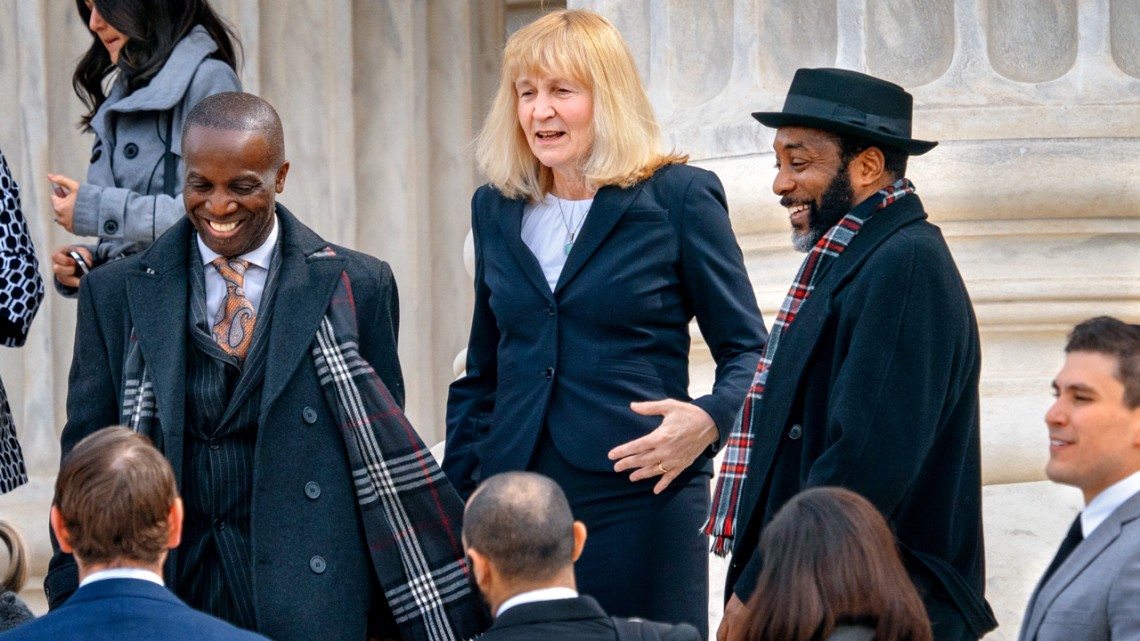
Sheri Lynn Johnson is pictured on the steps of the U.S. Supreme Court in March.
Cornell Law School professor wins Supreme Court death penalty appeal
By Chris Brouwer
The U.S. Supreme Court on Friday overturned the 2010 murder conviction of Mississippi death row inmate Curtis Flowers, who was represented by Sheri Lynn Johnson, the James and Mark Flanagan Professor of Law.
Flowers, who is black, had been tried six times by the same white prosecutor for a 1996 quadruple murder that he says he did not commit. Johnson, assistant director of the Cornell Death Penalty Project, argued on Flowers’ behalf before the court in March.
In the 7-2 ruling written by Justice Brett Kavanaugh, the court agreed with Flowers’ defense team – which included Keir Weyble, clinical professor of law and director of death penalty litigation for the Cornell Death Penalty Project, as co-counsel – that state prosecutor Doug Evans’ repeated removal of prospective black jurors constituted racial discrimination. At contention in the case was whether the Mississippi Supreme Court had failed to properly apply the precedent of the 1986 Supreme Court ruling in Batson v. Kentucky in concluding that the prosecutor’s actions were not motivated by discriminatory intent.
The majority opinion was joined by the court’s four liberal justices as well as Chief Justice John Roberts and Justice Samuel Alito. Justices Clarence Thomas and Neil Gorsuch dissented.
“We are grateful that the Supreme Court has reversed Curtis Flowers’ conviction,” said Johnson, who called the decision a “victory for everyone.”
“Seven members of the court painstakingly analyzed the complex factual record and concluded that Doug Evans discriminated on the basis of race in a decision that reaffirms the importance of racial fairness in the administration of criminal justice, both for the defendant and for the community,” Johnson said.
“The numbers speak loudly,” Kavanaugh wrote in his opinion. “Over the course of the first four trials, there were 36 black prospective jurors against whom the state could have exercised a peremptory strike. The state tried to strike all 36. Equal justice under law requires a criminal trial free of racial discrimination in the jury selection process.”
“A 7-2 vote is about as close to consensus as one is likely to see in a death penalty case before this court, which speaks to the powerful persuasiveness of Sheri’s advocacy,” said Eduardo M. Peñalver ’94, the Allan R. Tessler Dean and Professor of Law.
Flowers has spent 22 years in prison, much of it on death row, and his appeal in the sixth trial has dragged on since 2010. On March 20, his case reached the Supreme Court of the United States, where Johnson, assistant director of the Cornell Death Penalty Project, argued on his behalf.
In their brief, Johnson and Weyble emphasized that the prohibition against racial discrimination in jury selection provides important protections for the rights of both defendants and jurors, and that it prevents the undermining of public confidence in the criminal justice system. They wrote, “All of those values were diminished by the Mississippi Supreme Court’s perfunctory treatment of the evidence of discrimination in this case.”
“The quadruple homicide in this case was a terrible crime, but Curtis Flowers did not commit it,” said Johnson. “While [the June 21] decision is extremely important, it is also important to recognize that the conviction the Supreme Court has now overturned was a product not only of racial discrimination in jury selection but also of a wide array of other forms of prosecutorial misconduct.”
Johnson says it is a “travesty” that Flowers has had to endure six trials and more than two decades on death row.
“A seventh trial would be unprecedented, and completely unwarranted given both the flimsiness of the evidence against him and the long trail of misconduct that has kept him wrongfully incarcerated all these years,” Johnson said. “We hope that the state of Mississippi will finally disavow Doug Evans’ misconduct, decline to pursue yet another trial, and set Mr. Flowers free.”
Chris Brouwer is editorial director at Cornell Law School.
Media Contact
Get Cornell news delivered right to your inbox.
Subscribe

